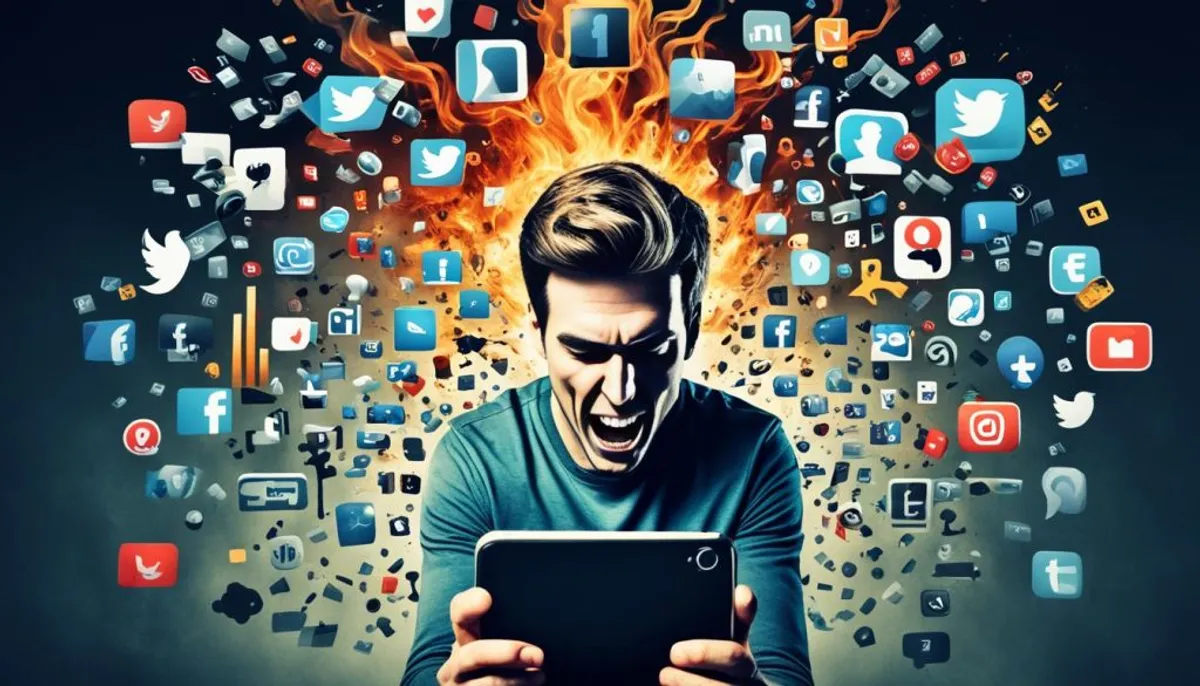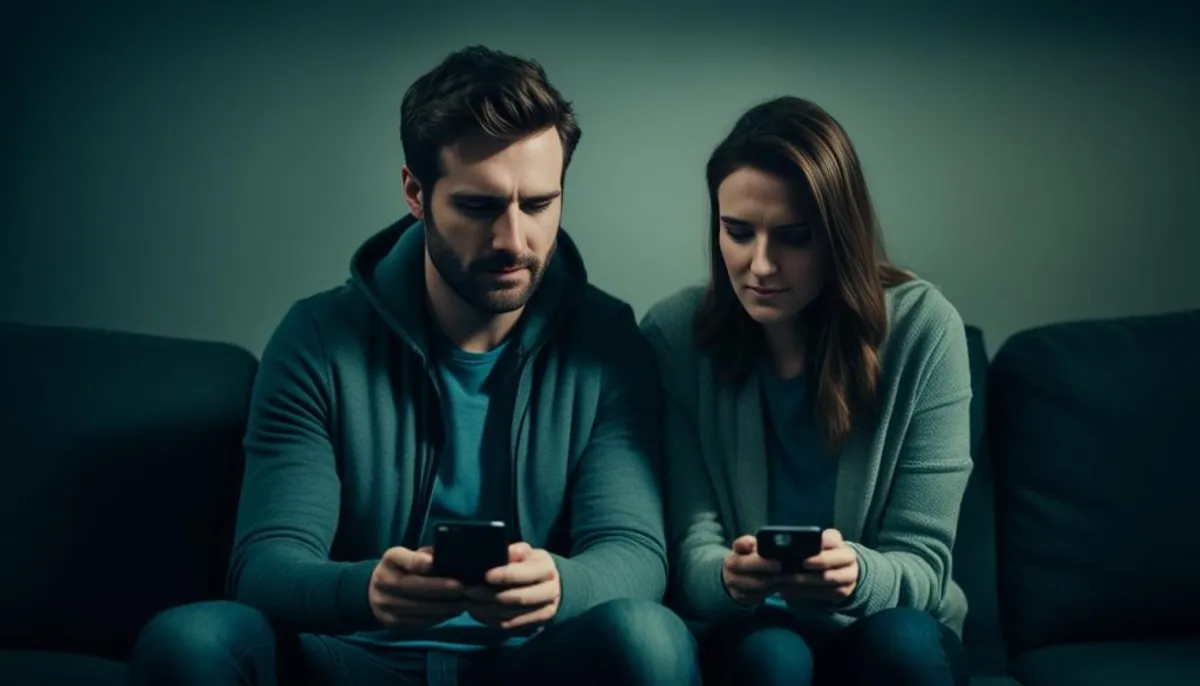Social media is a big part of our lives today. It lets us connect and share with people all over the world. But, it also has dangers we need to know about. This article will look at the risks of social media addiction, its effects on mental health, relationships, productivity, privacy, and security concerns. By understanding the risks, we can use social media wisely and protect our well-being.

Many people are now addicted to the internet, spending too much time scrolling and checking notifications. This addiction can harm our mental health, leading to anxiety, depression, and decreased self-esteem. Social media also shows us perfect lives, making us feel like we’re not good enough.
Social media is also a place where cyberbullying and online harassment happen. People can hide behind screens and act mean, hurting others, especially kids and teens.
Using social media means sharing a lot of personal info. This info can be used by online predators and malicious actors, putting us at risk. Also, misinformation and fake news spread fast on these platforms, making it hard to know what’s true.
We need to find a good balance between our online and real-life worlds. Social media should make our lives better, not worse. By knowing the dangers and taking steps to avoid them, we can use social media safely. This way, we protect our mental health, privacy, and our real relationships.
The Toxic Lure of Social Media Addiction
In today’s world, social media is hard to ignore. But, the endless scrolling and constant notifications can harm our mental health and productivity. Social media addiction is linked to anxiety, depression, and low self-esteem.
Endless Scrolling and Its Mental Health Toll
Seeing others’ perfect lives online can make us feel not good enough. This leads to more stress and a negative effect on our well-being. The need to check for updates and respond to messages distracts us a lot, making it hard to focus on what’s important.
Productivity Drain from Constant Notifications
Social media notifications can break our work flow, making us less productive. The urge to see the latest posts and comments can be strong. This makes us lose focus and ignore our important tasks.
To fight social media addiction, we need a healthy relationship with these platforms. A digital detox, setting boundaries, and focusing on our mental health are key. They help us take back control and balance our online and offline lives.
Cultivating Unrealistic Expectations and Low Self-Esteem
Social media has made us all look at a social media highlight reel that’s not real. People share only the best parts of their lives, making it seem perfect. This can make others feel they don’t measure up, leading to unrealistic expectations and low self-esteem.
Seeing posts about exotic trips, fancy items, and trendy clothes makes it seem like being popular means living a certain way. This curated online persona can make people feel bad about themselves. They feel they can’t live up to the perfect lives shown online.
This social media highlight reel can really affect our mental health. People often compare themselves to others, feeling their lives aren’t good enough. This can lead to low self-esteem, feeling not good enough, and even depression and anxiety.
Breaking the Cycle of Comparison
To fight the bad effects of the social media highlight reel, we need to:
- Understand that what we see on social media isn’t always real.
- Stop spending too much time scrolling through our feeds.
- Work on building real connections and celebrating what makes us unique.
- Do things that help us accept ourselves and grow.
Being aware of how social media can affect our mental health helps us stay strong. Taking steps to keep a healthy view of it lets us use social media better.

Cyberbullying and Online Harassment: A Pervasive Threat
In today’s world, social media is a breeding ground for cyberbullying and online harassment. These actions threaten the mental health and well-being of users. The anonymity of these platforms encourages harmful behavior, hurting those who are targeted.
The case of Selena Gomez highlights the dangers of online culture, including the threat posed by online predators. When she stopped using Instagram because of constant harassment, it made people talk more about cyberbullying. It also made us think about how the media covers these issues.
Cyberbullying and online harassment can deeply affect people. It can lead to more anxiety, depression, and even thoughts of suicide. Social media safety is now a big concern. The effects on mental health, especially for young people, can last a long time.
To fight this problem, social media needs to do more. They should improve their reporting systems, moderate content better, and help those affected. Teaching people and spreading awareness about social media safety is also key. It helps create a safer online space and helps users stay safe.
| Cyberbullying Statistics | Percentage |
|---|---|
| Percentage of teens who have experienced cyberbullying | 59% |
| Percentage of teens who have witnessed cyberbullying | 90% |
| Percentage of cyberbullying incidents that go unreported | 95% |
It’s important to tackle the toxic online culture of cyberbullying and harassment. This helps protect the mental health of social media users, especially those who are more vulnerable. By making the online world a positive place, we can help people feel safe and strong online.
Privacy Perils: Oversharing and Data Security Risks
In today’s world, sharing personal info online is a big worry for many. People share their lives online without realizing the risks. This makes them open to identity theft, online scams, and other dangers. It’s key to protect your info online to avoid these risks.
Safeguarding Personal Information in the Digital Age
Being aware of social media privacy concerns and data security risks is vital. You need to manage your online life carefully to keep your personal information safe. Here are some important steps:
- Check and update your social media privacy settings to keep your info private.
- Think twice before sharing your address, phone number, or bank info online.
- Choose strong, unique passwords for all accounts and use two-factor authentication if you can.
- Watch out for suspicious emails, messages, or links that could be online scams.
- Keep an eye on your accounts for anything odd and report identity theft right away.
By following these steps, you can lower the risks of sharing too much on social media and consider a digital detox to further enhance your privacy. This helps keep your personal information safe from misuse.
| Potential Risks | Preventive Measures |
|---|---|
| Identity Theft | Use strong, unique passwords and enable two-factor authentication. |
| Online Scams | Be cautious of unsolicited emails, messages, and links. |
| Exploitation of Personal Information | Review and update privacy settings on social media platforms. |
The Danger of Social Networks: Fake News and Misinformation
In today’s digital world, fake news and misinformation spread fast on social media. These lies, fueled by sensational stories and social media algorithms, harm our public discourse. They also make our society more divided.
Social media wants to keep us hooked. It uses algorithms that show us what grabs our attention first. This means false information can spread fast, changing what we think and hurting trust in true news. Understanding cyberbullying statistics is crucial in recognizing the impact of these platforms on user behavior.
Social media companies are trying to fight this with fact-checking and rules. But, it’s a big challenge. We need a mix of tech, rules, and teaching to solve it.
As users, we must be careful with what we share and believe. Checking facts before we act helps stop the spread of fake news and misinformation. This helps keep our public discourse honest.
We need to work together to make digital literacy better. We should push for clear media and true reporting. This way, we can keep our online world safe and our society’s discussions healthy.
Eroding Real-Life Connections and Relationships
Social media has changed how we connect with others. It helps us stay in touch with friends and family. However, the social media impact on relationships can also harm the quality of our real-life talks.
Trying to look perfect online can cause misunderstandings. We might show a different side of ourselves than who we really are. This can lead to problems in our relationships.
Being always connected can make us miss out on real conversations. It pulls us away from spending quality time with those close to us. This can make us feel lonely and hurt our real-life connections.
Striking a Balance Between Online and Offline Interactions
To keep our relationships strong, finding a balance is key. We should limit our screen time and focus on being with our loved ones. It’s important to talk face-to-face to build strong bonds.
Using social media wisely helps us keep our real-life connections strong. Sometimes, taking a break from social media can help us focus on what’s important. This way, we can make sure social media improves our relationships, not hurts them.

Conclusion: Navigating the Digital Landscape Mindfully
Looking at the dark side of social media shows us why we need to pay attention. Social media can lead to addiction, make us feel bad about ourselves, and put our privacy at risk. It’s important to use it wisely to keep our minds and hearts healthy.
We can use mindful social media consumption and get help from groups like Give an Hour. By setting limits, choosing what we see online, and focusing on real-life friends, we can stay safe. This helps protect our mental health and well-being.
We all need to work together for a digital world that cares about our well-being. By being more thoughtful about how we use social media, we can make the most of it. This way, we can build a better digital future for everyone.
RelatedRelated articles



